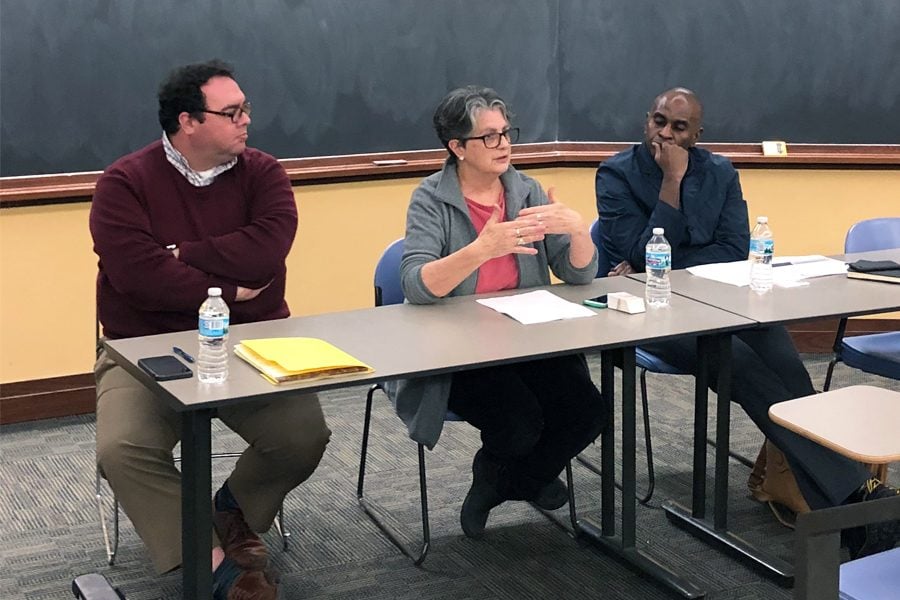Panelists raise awareness about Rohingya refugee crisis at UNICEF NU event
Alison Albelda/Daily Senior Staffer
UNICEF NU panelists Haydon Cherry, Laura Toffenetti and Dr. Rohan D. Jeremiah speak in Harris Hall. During the event, the three speakers advocated for more awareness about the Rohingya refugee crisis
January 25, 2019
Raising awareness of the ongoing international Rohingya refugee crisis is essential in ending it, panelists said at a Thursday event hosted by UNICEF NU.
During the event held in Harris Hall, two professors and a refugee advocate spoke about the nearly 700,000 displaced Rohingya, members of a Muslim ethnic minority group who have fled violence and discrimination in Myanmar’s western Rakhine State. The government of Myanmar, a predominantly Buddhist country, denies the Rohingya people citizenship and views them as illegal immigrants from Bangladesh.
Conflicts between Rakhine Buddhists and the Rohingya date back to 1948, but the crisis reached its peak in August 2017 after Rohingya Arsa militants launched deadly attacks on more than 30 police posts. Over the following month, a counter attack resulted in the burning of 288 villages and the killing of at least 6700 Rohingya — including at least 730 children under the age of five. Since then, many Rohingya have fled to Bangladesh, Malaysia, Thailand and the United States.
The Rohingya started arriving in the U.S. in 2012, said Laura Toffenetti, one of the panelists. Toffenetti is the assistant director of the Rohingya Culture Center, which helps refugees adjust to life in the U.S. by providing services such as English language instruction.
Toffenetti said most people aren’t fully aware of the refugee crisis, and the Rohingya people don’t have anyone speaking up for them. She stressed the importance of recognizing refugees as real people that have been thrown into a “horrible situation” that they don’t deserve.
“The world in general is still making this possible,” Toffenetti said. “Sometimes, it feels like too big of a problem, and I ask myself ‘How can I do anything?’ Tell people about it — not enough people know about it.”
Panelist and University of Illinois Chicago Prof. Rohan D. Jeremiah said his studies explore well-being and the disparities within refugee and immigrant health. Jeremiah said for people who seek refuge in the U.S., the plight doesn’t end when they arrive.
He added that the recent rhetoric around refugees and Islam that has circulated during the Trump administration is concerning to the Rohingya people. It reminds them of the same thing they ran away from, Jeremiah said.
“It’s a daily struggle to survive, in terms of the repercussions of what happened to them,” he said. “The conflict is ongoing, they’re constantly being bombarded by stories of what’s happening and they have no way to help once they’re here. This is going to be an issue that transcends for generations.”
Amrita Krishnan, president of UNICEF NU, said the group wanted to talk about this specific crisis due to how underpublicized it is.
“It’s definitely something that if Northwestern students wanted to advocate for it they could make a real impact,” the Weinberg junior said. “The people need the media attention.”
Weinberg sophomore Angelica Cruz said she didn’t know a lot about the crisis before the panel. Her biggest takeaway from the event was the suffering of the Rohingya people, as well as the lack of mental health services available to refugees who have been through trauma.
“There’s a lot of students on campus who are interested in advocating for different issues, and I feel like if they just knew about it even more, we could get the word out,” Cruz said. “It’s important to start somewhere, and if we can start at Northwestern, that’s important.”
Email: susanavazquez2022@u.northwestern.edu
Twitter: @suzy_vazquez
Related Stories:
James Foley Medill Medal for Courage in Journalism awarded to two Reuters journalists sentenced to prison in Myanmar
Video: Rohingya refugee finds home in Chicago



